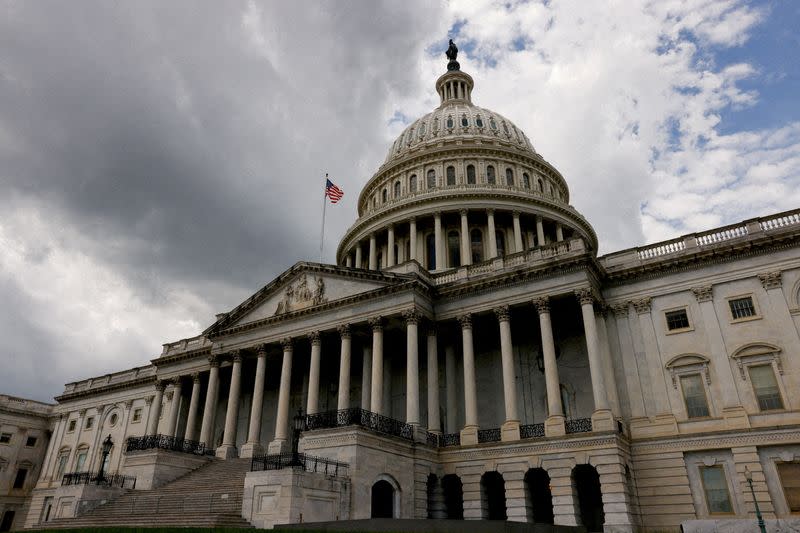'Chaotic' US Congress hurtles toward new government shutdown deadline

- Oops!Something went wrong.Please try again later.
- Oops!Something went wrong.Please try again later.
- Oops!Something went wrong.Please try again later.
- Oops!Something went wrong.Please try again later.
By David Morgan
WASHINGTON (Reuters) - The U.S. Congress on Monday showed no sign of moving forward on spending bills to avoid a partial government shutdown in just five days, as lawmakers entered a new week of political chaos over funding and aid to U.S. allies.
The top Democrats and Republicans in Congress on Tuesday are due to visit the White House to meet with Democratic President Joe Biden, who has been pushing for months for fresh aid to Ukraine and Israel, as well as urging lawmakers to avoid a shutdown.
Senate Republican leader Mitch McConnell dismissed the shutdown danger on Monday as he exited a meeting in Democratic Senate Majority Leader Chuck Schumer's office, telling reporters: "No, we're not going to shut the government down."
Schumer told reporters earlier that "Democrats are doing everything we can to avoid a shutdown."
But the two Senate leaders do not speak for the Republican-controlled House of Representatives, where a group of conservative hardliners have repeatedly blocked legislation.
The House is also grasping for a way forward on vital U.S. aid to Ukraine, Israel and Taiwan, and plans to hear closed-door testimony from Biden's son, Hunter Biden, in an impeachment probe that has failed so far to turn up evidence of wrongdoing by the president.
The Senate, meanwhile, is awaiting articles of impeachment against Biden's top border official, narrowly approved by House Republicans.
Congress has been characterized by Republican brinkmanship and muddled priorities over the past year, more so since Republican presidential frontrunner Donald Trump undermined a bipartisan border deal in the Senate and now wants aid to U.S. allies extended as loans.
Almost two months have passed since Republican House Speaker Mike Johnson and Schumer agreed on a $1.59 trillion discretionary spending level for the fiscal year that began on Oct. 1.
"It's becoming more chaotic," said Brian Riedl, senior fellow at the right-leaning Manhattan Institute. "The longer Congress is dysfunctional, the further they fall behind on very time-sensitive, high-priority legislation."
INTRA-REPUBLICAN FIGHTING
That dysfunction has eclipsed classic partisan bickering between Republicans and Democrats, with hardliners now forming their own opposition party within Republican ranks.
Major ratings agencies say the repeated brinkmanship is taking a toll on the creditworthiness of a nation whose debt has surpassed $34 trillion.
In the latest sign of an ungovernable House Republican majority, some hardliners are threatening to oust Johnson as speaker if the Christian conservative allows a vote on the $95 billion foreign aid bill that passed the Senate with overwhelming bipartisan support.
On another front, the White House has stepped up personal attacks on Johnson for blocking bills Biden supports.
As the government funding deadline inches closer, some lawmakers worry that hardline demands for policy riders that restrict access to abortion, defund diversity programs and promote gun rights could cause further delay.
But Representative Mike Simpson, a senior Republican appropriator, said Congress can steer clear of a shutdown.
"We cannot let unrealistic policy expectations get in the way of effective governing. We must get these bills across the finish line," Simpson said in a statement.
Further complicating the path forward, senators are due to be sworn in as jurors for the trial of U.S. Homeland Security Secretary Alejandro Mayorkas, who the House impeached along partisan lines on Feb. 13 on charges that he has failed to enforce immigration law and made false statements to Congress.
A Senate trial cannot begin until the House delivers the articles of impeachment, and sources said the two chambers have not yet agreed on a delivery date.
To avert a shutdown, Schumer may need unanimous consent from senators, including Republican hardliners, if the chamber is to act on appropriations before the Friday deadline.
"It's going to be difficult to get it done on time," said Senator John Boozman, a senior Republican appropriator. "Hopefully, we won't have a government shutdown. But if we do, just a few days as we're working in good faith to get it passed, that really wouldn't mean much."
The absence of time has led to speculation that lawmakers could opt for a short-term stopgap measure to keep federal agencies open while Congress acts.
McConnell did not respond to questions about a short-term stopgap on Monday.
Johnson and other Republicans oppose a short-term stopgap, known as a continuing resolution or CR. But circumstances may have the last say.
"If it's an option between a three-day shutdown and a three-day CR, I'd do the CR," said Representative Don Bacon, who would otherwise reject another stopgap.
The House Freedom Caucus has instead urged Johnson to pass a continuing resolution for the remainder of 2024 that would trigger a 1% across-the-board spending cut under a 2023 deal between Biden and Johnson's predecessor, Kevin McCarthy.
Republican Senator Rick Scott, a staunch conservative, favors the same approach, but with U.S. aid to Israel included, along with a full-year defense appropriations bill to protect the Pentagon from spending cuts.
(Reporting by David Morgan; Additional reporting by Katharine Jackson and Andy Sullivan; Editing by Scott Malone and Bill Berkrot)

